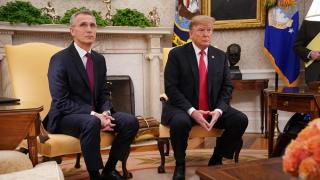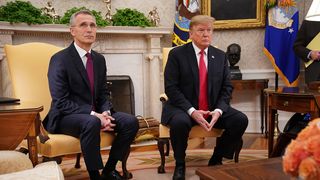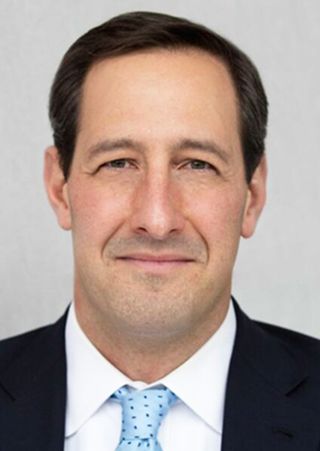Europe might seem far away, but its strategic predicament offers important lessons for Australia.
Addressing a joint session of the US congress last week commemorating NATO’s 70th anniversary, secretary-general Jens Stoltenberg said that since its founding in 1949, “every congress, every American president, your men and women in uniform, and the people of the United States, have been staunch supporters … the backbone of our alliance”.
Many will consider this an implicit rebuke of US President Donald Trump, who has taken aim at the transatlantic alliance, berating NATO allies for not contributing enough for their own defence and questioning the benefits to the US from its commitment to Europe.

But equally significant are other arguments Stoltenberg contradicted: that a less engaged America would somehow produce more stability and prosperity around the world and that NATO was no longer able to address the challenges of the 21st century. This discussion is relevant not only for Europe but also for Asia in general, and Australia specifically.
The first argument makes a seemingly compelling, but ultimately facile, case. The less the US does, so the argument goes, the more others must pull their own weight. Its appeal is clear: it promises Americans that their sons and daughters can step back from Europe, the Middle East and Asia. Americans will pay fewer costs in lives and dollars, leading to a more secure, prosperous and powerful US.
The second commonly voiced critique is that America’s alliances might have been useful during the Cold War, but are a product of that era, unfit for the dynamism of this century. This line of thinking holds that the purpose of alliances such as NATO collapsed with the Soviet Union in 1991.
Stoltenberg challenged both of these arguments. On the first, he cited the 1930s, when the failure to stand up for nations facing external aggression, the failure to prevent rampant protectionism and to defend democratic values produced a leadership vacuum and invited chaos and war.
A main goal of postwar US foreign policy has been to prevent Asia, the Middle East or Europe from being dominated by a single power. Without the US’s balancing role, there’s little to suggest that China, Russia, or Iran would restrain themselves.
A main goal of postwar US foreign policy has been to prevent Asia, the Middle East or Europe from being dominated by a single power. Without the US’s balancing role, there’s little to suggest that China, Russia, or Iran would restrain themselves.
In fact, the opposite is much more likely to occur and democratic states would find themselves more exposed and less secure.
Although stationing US troops and hardware overseas does carry an associated cost, it has allowed the US to project power and stability around the world. By taking on the security concerns of US allies, America has blunted aggression and traditional regional rivalries, and has kept nuclear proliferation in check. These certainly help American allies, but they benefit the US just as much.
The second point — that alliances such as NATO have outlived their purpose — also has less substance than critics might think. NATO adapted after the Cold War, fighting to end ethnic cleansing in the Balkans, combating terrorism in the Middle East and helping to spread democracy, peace, and prosperity to central and eastern Europe after the Iron Curtain came down.
In any case, NATO has been adapting by readjusting itself for the challenges it faces, such as enabling intelligence sharing on terrorist threats. And the traditional raison d’etat for NATO has not gone away. In fact, NATO is more critical than ever in dealing with a more assertive Russia, which is annexing territory by force, carrying out chemical attacks in Europe, and interfering in democratic political systems of member states. NATO is also beginning to take on the myriad security, economic, and political threats posed by China.
A balance of power in Asia is dependent on Australia and other nations hosting a US military presence. Without that, the geographical distances are too great for the US to remain a balancing power.
The Pacific has no NATO, but that doesn’t render those arguments irrelevant. Alliances matter just as much in this region as they do in Europe. Australia does not have an institutionalised collective security arrangement in Asia like Europe does with NATO. This is a strong argument for Australia doing more to engage, facilitate, and entrench a US presence and role in the region rather than less, never forgetting there is no balance in the region without the US.
It’s precisely why China’s strategy is to dilute and weaken alliances with the US. A balance of power in Asia is dependent on Australia and other nations hosting a US military presence. Without that, the geographical distances are too great for the US to remain a balancing power.
The relatively benign security and economic conditions of the post-Cold War era have given way to an era of great power competition as China and Russia lead the charge to undermine large parts of the rules-based order. This competition is likely to increase as these authoritarian powers use new forms of technology to reach into democratic societies, exacerbate internal tensions and carve out regional spheres of influences. America and Australia must ensure that their alliance is ready to face this challenge.
It is here that Stoltenberg’s defence of NATO is the most instructive. It should serve as a stark reminder that Australian and US democratic values are under assault today, that defence of both nations’ interests requires adapting the alliance to deal with these challenges, that such an update cannot be based on sentimentality, and that regional stability, economic openness, the advance of democratic ideals and institutions, and the protection of concepts like self-determination, non-aggression and freedom of navigation requires more — not less — engagement between Canberra and Washington.






